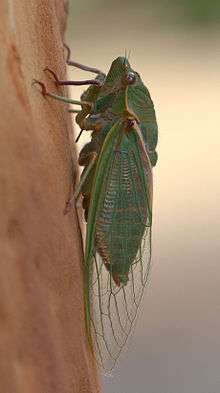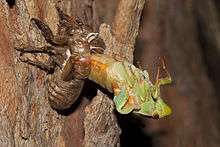Cyclochila australasiae
| Cyclochila australasiae | |
|---|---|
 | |
| Scientific classification | |
| Kingdom: | Animalia |
| Phylum: | Arthropoda |
| Class: | Insecta |
| Order: | Hemiptera |
| Family: | Cicadidae |
| Genus: | Cyclochila |
| Species: | C. australasiae |
| Binomial name | |
| Cyclochila australasiae (Donovan, 1805) | |
| Synonyms | |
|
Tettigonia australasiae Donovan | |
Cyclochila australasiae, commonly known as the green grocer, is a species of cicada and one of Australia's most familiar insects. It is distributed through coastal regions of southeastern Australia.[1] It is one of the loudest insects in the world.[2]
Taxonomy
Cyclochila australasiae was formerly commonly known as the Great Green Cicada; in addition, the various colour forms have different vernacular names, including yellow Monday for a common yellow morph; Chocolate Soldier for a rare dark tan form; and Blue Moon for a rare turquoise form.[3] The names for the green and yellow forms have been recorded since at least 1896.[3] Walter Wilson Froggatt reported that the green form was known as green Monday (alongside yellow Monday for the yellow form) in his 1907 work Australian Insects.[4]
The species was first described by amateur zoologist Edward Donovan as Tettigonia australasiae in 1805, while Ernst Friedrich Germar named it Cicada olivacea in 1830.[5]
Description
Cyclochila australasiae measures about 4 cm (1.6 in) in length, with a wingspan of 11–13 cm (4–5 in). Diverse colour forms are seen, the most common being predominantly green or brownish yellow. It has red eyes. The exuvia, or discarded empty exoskeleton of the nymph form, is commonly seen on tree trunks in gardens and bushland during the summer months.[1]
The loud calls of the male are heard over the summer months; harsh and high-pitched, these may reach 150 decibels. The sound is made by the rapid buckling of the timbal ribs, and amplified by resonation in an air sac; the frequency is around 4.3 kHz.[6] Calls occur in the afternoon and dusk of warm days.[3]
Distribution and habitat
Cyclochila australasiae is found from Kroombit Tops in southeastern Queensland through eastern New South Wales and Victoria to the Grampians, and through to Mount Gambier in southeastern South Australia. It is common along the Great Dividing Range, and is also found in the Warrumbungles. It is commonly seen (and heard) around Sydney and Melbourne, the Blue Mountains and Gippsland. In Brisbane, it is only encountered at elevations above 300 m (1000 ft).[7] It was associated with the white stringybark (Eucalyptus globoidea) in a study at three sites in western Sydney.[8]
Life cycle


The cicada spends seven years in nymph form drinking sap from plant roots underground before emerging from the earth as an adult. The adults, who live for six weeks, fly around, mate, and breed over the summer.[3]
In popular culture
Live cicadas are often collected by climbing trees and can be kept temporarily as pets in shoeboxes. They cannot easily be kept for longer than a day or two, given that they need flowing sap for food.[9]
References
| Wikimedia Commons has media related to Cyclochila australasiae. |
- 1 2 Hangay G, German P (2000). Insects of Australia. Frenchs Forest, NSW: New Holland Press. pp. 58–59. ISBN 1-876334-41-X.
- ↑ "Cicadas". Australian Museum. Retrieved 2007-12-05.
- 1 2 3 4 "Greengrocer, Yellow Monday Fact File". Australian Museum online - Wildlife of Sydney. Australian Museum. 2009. Archived from the original on October 30, 2009. Retrieved 2009-04-03.
- ↑ Froggatt, Walter Wilson (1907). Australian Insects. Sydney, New South Wales: W. Brooks. p. 349.
- ↑
- ↑ Gerhardt HC, Huber F (2002). Acoustic communication in insects and anurans: common problems and diverse solutions. Chicago: University of Chicago Press. p. 33. ISBN 0-226-28832-3.
- ↑ Moulds, Maxwell Sydney (1990). Australian Cicadas. Kensington, NSW: New South Wales University Press. pp. 61–65. ISBN 0-86840-139-0.
- ↑ Emery, D.L.; Emery, S.J.; Emery, N.J.; Popple, L.W. (2005). "A phenological study of the cicadas (Hemiptera: Cicadidae) in western Sydney, New South Wales, with notes on plant associations". Australian Entomologist. 32: 97–110.
- ↑ Craig, Owen (17 February 2001). "Summer of singing cicadas". ABC Science – Environment and Nature. Australian Broadcasting Corporation. Retrieved 15 August 2013.